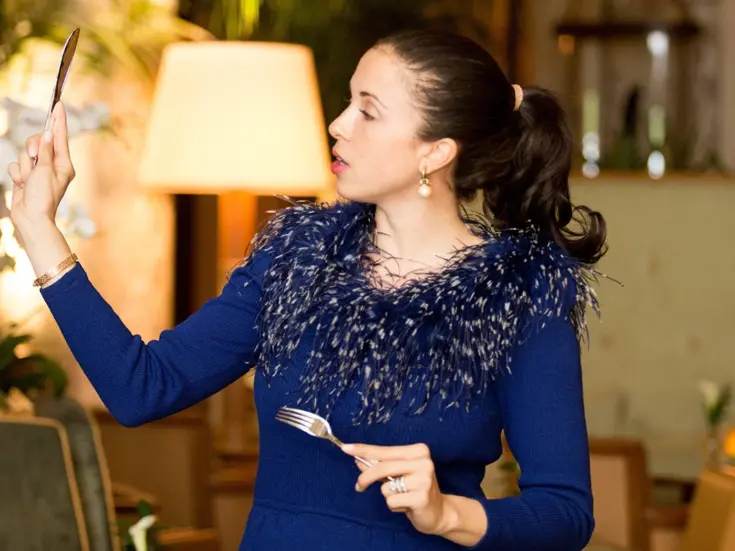
Taking to his bed after eating too-rich food during a culinary festival in Abu Dhabi gives Jason Cowley occasion to ponder whether, culturally speaking, the emirate has bitten off more than it can chew
I ARRIVED IN Abu Dhabi just after midnight one Friday in February on a delayed flight from London. It’s always reassuring to arrive alone at an airport in an unfamiliar country and know that someone will be waiting for you, and there, after I passed through security, was my man, a short fellow from South Asia, one of more than a million migrant workers from India, Pakistan and Bangladesh who live in the UAE and send most of their tax-free earnings back home.
He was wearing a white shirt and black tie and was diligently holding aloft a placard with my name printed on it. We drove through the warm night at a disconcerting pace to my hotel, the Shangri-La, which was lit up like Gatsby’s mansion on the evening of one of his parties. ‘Your hotel,’ the driver said as he hurried me towards the lobby, ‘has the best buffet in Abu Dhabi.’ I was to hear this said of the hotel by other people I met, and so it was useful, to borrow a line from Larkin, to get that learnt early in the trip.
Except, when I came to check in there was no record of me in the hotel computer. Outside on the forecourt, three shining white Mercedes looped in circles, horns blaring. Something about the high spirits of a wedding party, I was told — alcohol-free, naturally. Inside the cars, Emirati women dressed in black abayas and hijabs peered out.
I showed the desk clerk confirmation of my hotel booking. ‘Sir,’ he said, ‘this is the Fairmont.’ I looked around glumly for my driver, who had long since departed. Perhaps I should hitch a ride in one of the Mercs…
By the time I arrived at the Shangri-La, in a beaten-up taxi, it was nearly 2am. As I waited to check in, three young Filipino women in short Friday-night dresses scuttled across the burnished lobby, trailing laughter and perfume behind them.

I’d not been in Dubai since before the financial crisis, when Abu Dhabi, which has the world’s sixth largest oil reserves and seventh largest gas reserves, was forced to bail out its upstart little brother after the real-estate crash of 2008. Much of the restlessness and frenzy of pre-crash Dubai — the desire to build the tallest buildings (look at us!), the most opulent hotels as well as artificial island estates in the sea, ideal second or third homes for mid-ranking Premier League footballers — was driven by insecurity: what happens to us when the oil runs out, as it will within the next two decades?
Abu Dhabi has no such worries, at least in the short term. It has 92 per cent of the UAE’s oil and its reserves are projected to last another 150 years, by which time the grand vision of Sheikh Khalifa bin Zayed Al Nahyan, head of the ruling family, to transform Abu Dhabi into a megalopolis will be complete. But at present, as also in Dubai, the feeling as you travel around Abu Dhabi on its blanched freeways (there are few roadside pathways and no one seems to walk anywhere) is one of unfinished business. Even the celebrated ‘seven-star’ Emirates Palace Hotel, where the Queen stayed on her visit, is surrounded by construction sites and the contorted skeletons of half-finished, sand-blasted buildings.
I toured the Palace, which is the size of an international airport terminal, in the company of Mohammed Alaoui, the unassuming communications manager who spoke as if in a conspiratorial whisper. The eighth floor of the hotel is reserved only for ‘kings and queens and presidents’, he told me (the Queen stayed on the eighth). The seventh-floor suites attract the international plutocracy. Mohammed was excited that Victoria Beckham had recently stayed at the hotel. ‘The seventh floor, of course,’ he murmured. Of course. ‘Bill Gates was here too,’ he continued. On the seventh? ‘No,’ Mohammed said. ‘He chose a normal room.’
I WAS IN Abu Dhabi as a guest of the annual gourmet festival, during which some of the world’s ‘masterchefs’ (Britain’s representative was Gary Rhodes, the self-styled punk cook who, let’s be honest, is not quite in the top division) are invited to the emirate to hold culinary ‘masterclasses’ and cook for guests. However, my own participation in the festival ended fairly abruptly after an eight-course tasting menu prepared by Hal Yamashita, an ‘innovative’ Japanese chef from Kobe. I was told that his ‘unique style and out-of-the-box recipes’ had won him much acclaim. But I found his raw fish and foie gras and Kobe beef combinations overworked and overelaborate — and I spent the next sickly 24 hours in bed, cursing the amiable innovator from Kobe.
Confined mostly to bed, drinking only mint tea brought to me at intervals by a kindly hotel porter, I was hugely disappointed to miss Daniel Patterson’s ‘Epicurean promotion’. Patterson is the storied chef and owner of the two-Michelin-starred Coi (pronounced kwah) in San Francisco. He is a resolute localist, using ingredients sourced from what he describes as the ‘diverse terrain of northern California, from the rugged coastline to the farms and mountains’ and recipes ‘passed down through the generations’. The meal he cooked, according to those who survived the experiments of Yamashita, was the festival’s outstanding event. And I missed it.
The gourmet festival is one more destination on Abu Dhabi’s journey of self-reinvention. If Dubai is the playground of the new rich, and especially of Premier League footballers and their Wags and agents, Abu Dhabi, culturally austere and socially conservative, wants to attract a more refined visitor. One way of achieving this is to invest in culture — art, music and literature and gourmet food festivals — but also in creating facsimiles of the world’s great cultural institutions, such as the Louvre and the Guggenheim on Saadiyat Island. But attracting visitors — or even completion — is not certain. Already there is a reining in of expectation: the Louvre and Guggenheim will now not open for many years to come.

Like Dubai and indeed the Gulf state of Qatar, improbable host of the 2022 football World Cup, Abu Dhabi understands how sport can be used as an instrument of soft power at home and abroad; Abu Dhabi in effect owns Manchester City and Qatar owns Paris Saint-Germain.
A FEW WEEKS before my visit, Tiger Woods (or a replica of him; one is never quite sure nowadays who the real Woods is, or indeed if he exists at all) and the Northern Irish prodigy Rory McIlroy were among the golfers taking part in the Abu Dhabi HSBC Championship, each receiving £1 million-plus appearance fees before a ball was struck. But, hey, at least they showed up.
The England cricket team were also in the UAE in January and February, playing three Test matches against Pakistan as well as one-day internationals in the ‘neutral’ spaces of Dubai and Abu Dhabi. The trouble is, for most of the matches, the stadiums were close to empty, presumably because the migrant Pakistanis were at work on their innumerable building sites and couldn’t get away for a day at the cricket, and because English tourists were elsewhere in the world or simply uninterested. In this instance, they had built the cricket stadiums and organised the matches, but still the fans had refused to come.
More details at visitabudhabi.ae and gourmetabudhabi.ae. Spend four nights at the five-star Shangri-La Qaryat Al Beri, Abu Dhabi, from £899 per person with Premier Holidays (includes B&B accommodation and flights from Heathrow with Etihad). Visit premierholidays.co.uk or call 08444 937 542.
Illustration by Rich Gemmell
Jason Cowley is the editor of the New Statesman








